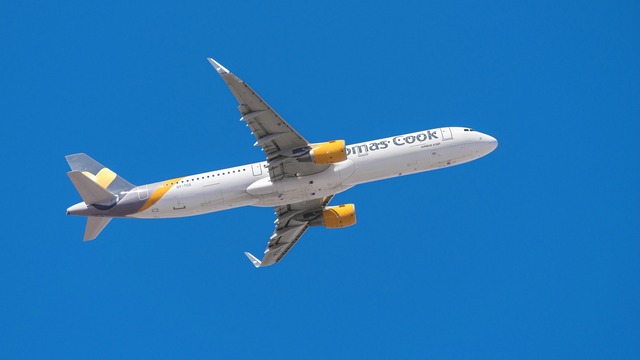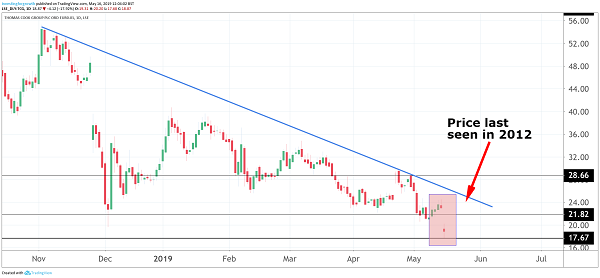Thomas Cook shares crash again
There are lots of reasons why this travel operator has fallen on hard times, but could things get worse.
16th May 2019 13:51
by Graeme Evans from interactive investor
There are lots of reasons why this travel operator has fallen on hard times, but could things get worse.

The market value of Thomas Cook (LSE:TCG) slid below £300 million today after another profits warning triggered by signs that Brexit is finally putting a dampener on summer holiday plans.
At lower than 19p following today's 18% slide, the stock is now back at the level seen during the dark days of 2012, when the company was in danger of being crushed under a mountain of debt.
Harriet Green's restructuring efforts revived the company's fortunes and sent shares as high as 189p in 2014 before she handed over to chief operating officer Peter Fankhauser later that year. Shares have struggled ever since, although a year ago they were still trading at 138p.
Analysts at Berenberg said recently the shares could be worth as little as 12p, which is the direction the stock appears to be heading after today's bottom-line loss of £1.45 billion. While this included £1.1 billion of goodwill impairment relating to the 2007 merger with MyTravel, margin pressure meant the underlying loss increased £65 million to £245 million.

Source: TradingView Past performance is not a guide to future performance
Compared with the declining market value of Thomas Cook, its latest net debt figure rose by £361 million on a year ago to more than £1.2 billion in today's half-year results, driven by the weaker trading performance and higher working capital outflows.
Much will now depend on the sale of the group's airline business, for which Thomas Cook says it has received multiple bids. This process won’t be straightforward, however, given that potential airline bidders are facing problems of their own due to industry overcapacity.
European regulators are also certain to take a keen interest, while there are questions over the impact on the Thomas Cook holidays business if it is no longer able to combine flights.
Estimates on how much Thomas Cook could raise from the plane sales varies, but it is likely to be more than £1 billion. Should all the proceeds be used to address net debt, analysts at Jefferies forecast last week that Thomas Cook would need £850 million or more for it to positively impact the balance sheet at the start of 2020, when it will need the cash the most.
Progress on the airline sale will also trigger a newly announced £300 million facility with lenders that will provide additional liquidity over the winter months.
That should offer a little reassurance to investors after a challenging start to the financial year, with last summer's prolonged heatwave and high prices in the Canaries denting demand for winter sun. Fankhauser added that there was "little doubt" that the Brexit process had led many UK customers to delay their holiday plans for the summer.
Competitive pressures resulting from the uncertainty are squeezing margins, while higher fuel and hotel costs are creating further headwinds.
Amid a slower pace of bookings, the company has reduced capacity and is also keeping a close eye on cash and cost discipline across the group.
However, it continues to invest in strategic opportunities, such as accelerating its higher margin, own-brand hotel growth. The company has opened 12 new hotels out of a pipeline of 20 for 2019.
Analysts at UBS now expect underlying earnings for the second half of 2019 to be lower than a year earlier, leading to a forecast for the year as a whole of £257 million. They have a price target of 27p, while counterparts at Jefferies were more optimistic prior to today's profits warning, at 43p.
These articles are provided for information purposes only. Occasionally, an opinion about whether to buy or sell a specific investment may be provided by third parties. The content is not intended to be a personal recommendation to buy or sell any financial instrument or product, or to adopt any investment strategy as it is not provided based on an assessment of your investing knowledge and experience, your financial situation or your investment objectives. The value of your investments, and the income derived from them, may go down as well as up. You may not get back all the money that you invest. The investments referred to in this article may not be suitable for all investors, and if in doubt, an investor should seek advice from a qualified investment adviser.
Full performance can be found on the company or index summary page on the interactive investor website. Simply click on the company's or index name highlighted in the article.